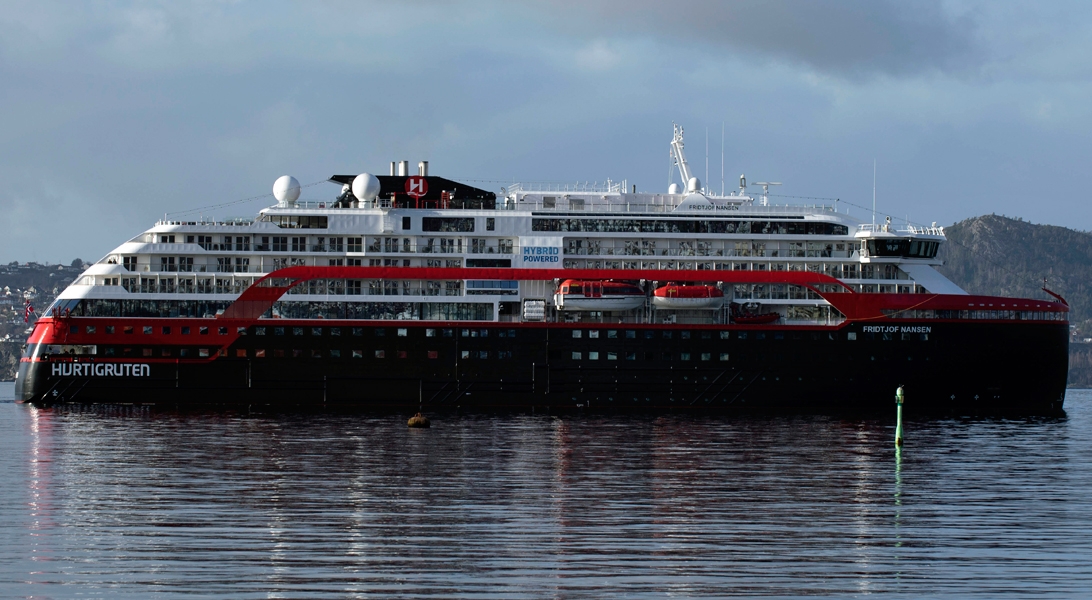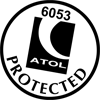This site uses cookies as defined in our Cookie Policy, by continuing to use this site you agree to their use.
Continue
| Arrive | Depart | ||||||
| 18th18 | OctOct | 202121 | 1 night accommodation before your cruise, staying in Panama City | ||||
| 19th19 | OctOct | 202121 | Panama City, Panama, embark on the MS Fridtjof Nansen | 18:00 | |||
| Expect incredible morning views as you arrive into the port for Panama City. Tinged with a silver pre-dawn light, the city will metamorphosise into a golden glow as the sun rises above it. And from then on expect one stunning view after another. Very interesting in its own right, Fuerte Amador is obviously overshadowed by its proximity to Panama City. So should the Miraflores museum of the Canal, which offers a comprehensive and immersive tour of the Canal including a 3-D experience, four exhibition halls, an observation deck, and a surprisingly good restaurant not interest you then there is always the option of lovely Casco Viejo – literally the old quartier of Panama. The grand old colonial houses, cobbled streets, independent boutiques and buzzing street scene make this a must stop on your itinerary. And if you like seafood, you will not want miss the many restaurants and market stalls serving different variations of so-fresh-it’s-still-practically-swimming ceviche. Best eaten like the Panamanians do, with salty crackers and a cold beer on the beach. And if money is no object, a cup of geisha coffee – supposedly the world’s best and definitely the world’s most expensive at $7 a shot is definitely a pick me up! Cool cosmopolitan capital aside, Panama has a skyscraper filled skyline that is worthy of some of its North American counterparts. But if urban utopia is not your scene then fear not, the sandy beaches and lush rainforests are never more than a short cab ride away. | |||||||
| 20th20 | OctOct | 202121 | At Sea | ||||
| 21st21 | OctOct | 202121 | Manta, Ecuador | 13:00 | 19:00 | ||
| 22nd22 | OctOct | 202121 | Puerto Bolívar, Ecuador | 10:00 | 20:00 | ||
| 23rd23 | OctOct | 202121 | Guayaquil, Ecuador | 11:00 | 20:00 | ||
| The second major jumping off point for the Galapagos Islands after Quito, this is a little city with a big heart. A sea port first and foremost, the city’s personality has been founded on that, and all the better it is for it too. Almost Caribbean in feeling, the clement climate coupled with the intermingling rhythms floating from the windows and abundance of fresh seafood make this a very tropical destination. Once not even considered by the travel books as a potential destination in its own right, the city has undergone something of a resurgence in the past few years. Proud Guayaquileños will not hestitate to point out the Malecón or the exciting new riverfront promenade, once a no-go area after dark, now happily (and hippily) lined with museums, restaurants, shops, and ongoing entertainment. The new airport and urban transportation network are also lauded to the happy tourists who find themselves here. As the largest and most populous city in Ecuador as well as being the commercial centre, it would only be natural that the city would have some kind of modern architecture, but it is the colourful favelas, or to use their real name guasmos, that cling to the side of the hillside like limpets that really catch your eye. A blend of old and new, the first inhabitants can be traced back to 1948 when the government cleared the area for affordable housing, these shanty towns are witness to the social and political particularities that Guayaquil has faced in the past. | |||||||
| 24th24 | OctOct | 202121 | At Sea | ||||
| 25th25 | OctOct | 202121 | Salaverry, Peru | 10:00 | 15:00 | ||
| Located about nine hours north of Lima, Trujillo was founded in 1534 by the Spanish conquistador Pizarro. The attractive, colonial city retains much of its original charm with elegant casonas, or mansions, lining the streets. Nearby is Chan Chan, the ancient capital of the Chimú, a local Indian tribe who came under the rule of the Incas. The area has several other Chimú sites, some dating back about 1500 years. The region is also famous as the home of the Peruvian Paso horses, as well as excellent beaches offering world-class surfing and other water sports. | |||||||
| 26th26 | OctOct | 202121 | Callao, Peru | 11:00 | 23:59 | ||
| When people discuss great South American cities, Lima is often overlooked. But Peru's capital can hold its own against its neighbors. It has an oceanfront setting, colonial-era splendor, sophisticated dining, and nonstop nightlife.It's true that the city—clogged with traffic and choked with fumes—doesn't make a good first impression, especially since the airport is in an industrial neighborhood. But wander around the regal edifices surrounding the Plaza de Armas, among the gnarled olive trees of San Isidro's Parque El Olivar, or along the winding lanes in the coastal community of Barranco, and you'll find yourself charmed.In 1535 Francisco Pizarro found the perfect place for the capital of Spain's colonial empire. On a natural port, the so-called Ciudad de los Reyes (City of Kings) allowed Spain to ship home all the gold the conquistador plundered from the Inca. Lima served as the capital of Spain's South American empire for 300 years, and it's safe to say that no other colonial city enjoyed such power and prestige during this period.When Peru declared its independence from Spain in 1821, the declaration was read in the square that Pizarro had so carefully designed. Many of the colonial-era buildings around the Plaza de Armas are standing today. Walk a few blocks in any direction for churches and elegant houses that reveal just how wealthy this city once was. But the poor state of most buildings attests to the fact that the country's wealthy families have moved to neighborhoods to the south over the past century.The walls that surrounded the city were demolished in 1870, making way for unprecedented growth. A former hacienda became the graceful residential neighborhood of San Isidro. In the early 1920s the construction of tree-lined Avenida Arequipa heralded the development of neighborhoods such as bustling Miraflores and bohemian Barranco.Almost a third of the country's population of 29 million lives in the metropolitan area, many of them in relatively poor conos: newer neighborhoods on the outskirts of the city. Most residents of those neighborhoods moved there from mountain villages during the political violence and poverty that marked the 1980s and ’90s, when crime increased dramatically. During the past decade the country has enjoyed peace and steady economic growth, which have been accompanied by many improvements and refurbishment in the city. Residents who used to steer clear of the historic center now stroll along its streets. And many travelers who once would have avoided the city altogether now plan to spend a day here and end up staying two or three. | |||||||
| 27th27 | OctOct | 202121 | Paracas, Peru | 10:00 | 18:00 | ||
| The port city of Paracas is blessed with magnificent natural beauty and rich historical importance, offerings inviting beaches, ideal weather and pleasant scenery — a combination that draws visitors throughout the year. The shores of the Paracas Peninsula and waters of the bay teem with wildlife and have been declared a national reserve. Condors frequently can be seen gliding on the sea winds or perched on the cliffs; pink flamingos often rest here on their migratory flights. The complex interaction between wind and ocean, sun and land has transformed this region into a kind of lunarscape under an equatorial sun. Another reason for travellers to come to this area is its proximity to the famous and mysterious Nazca Lines. Visible from the air, these strange markings stretch for miles on a large barren plain and have bewildered archaeologists, historians and mathematicians since their discovery over a century ago. The earliest Andean people found shelter here. The Paracas culture was known for fine weavings in geometrical designs and vibrant colours, which have been preserved for thousands of years by the dry climate. Some of the finest examples are in museums in Lima. The town of Ica is Peru’s finest wine centre, as well as home to the fiery brandy-derived beverage known as Pisco. The surrounding area features oases with springs considered to have medicinal cures. Pier Information The ship is scheduled to dock at Port of Paracas, about a 45-minute drive from Ica. There are no passenger facilities at the pier. Shopping Shopping opportunities are limited; some souvenirs can be found at the museum in Ica. A bottle of Peruvian Pisco (grape brandy) makes a nice memento. The local currency is the nuevo sol. Cuisine Seafood is highly recommended, however, we recommend you dine only in the hotel restaurants in Peru’s southern region. Be sure to sample the national drink pisco sour and the area’s excellent wines. Always drink bottled water and avoid ice cubes. Other Sites The Bay of Paracas is sheltered by the Paracas peninsula, noted as one of the best marine reserves in the world. This is also a popular resort area thanks to its beautiful bay, beaches and dependable warm weather. Facilities include swimming pools, tennis courts, miniature golf and a good restaurant. For those who are looking for a little adventure dune buggies are available. Local boat trips can be booked to the Ballestas Islands but be aware that commentary is given in Spanish. Private arrangements for independent sightseeing are limited in this port as cars have to come from Lima. Please submit your request to the Tour Office early in the cruise. | |||||||
| 28th28 | OctOct | 202121 | At Sea | ||||
| 29th29 | OctOct | 202121 | Matarani, Peru | 08:00 | 18:00 | ||
| Matarani is located on the south-western coast of Peru and gives access to the colonial city of Arequipa, 75 miles (121 km) inland. From here it is a 200 mile (322 km) drive to Lake Titicaca and 400 miles (644 km) to Cuzco and Machu Picchu. This major port is an important element in the current plan between the governments of Peru and Brazil to afford easy commercial movement between the Atlantic and the Pacific Oceans by both countries. Matarani is the gateway to Arequipa, where you discover its very interesting prehistory that spanned over 10,000 years, ending with the arrival of the Spanish in the 1530s. Arequipa is rich with not only Inca archaeology, but also various pre-Inca cultures, and even earlier nomadic hunter-gatherers. Arequipa is also known as the 'Ciudad Blanca' (White City) for the numerous and magnificent constructions of temples, convents, big houses and palaces sculpted in white ashlar. It also possesses an excellent climate with almost 300 days of sun a year, with transparent blue sky. | |||||||
| 30th30 | OctOct | 202121 | Arica, Chile | 08:00 | 16:00 | ||
| Arica boasts that it is "the land of the eternal spring," but its temperate climate and beaches are not the only reason to visit this small city. Relax for an hour or two on the Plaza 21 de Mayo. Walk to the pier and watch the pelicans and sea lions trail the fishing boats as the afternoon's catch comes in. Walk to the top of the Morro and imagine battles of days gone by, or wonder at the magnitude of modern shipping as Chilean goods leave the port below by container ship.Arica is gaining notice for its great surfing conditions, and in 2009 hosted the Rusty Arica Pro Surf Challenge, a qualifying event to the world series of surf. | |||||||
| 31st31 | OctOct | 202121 | At Sea | ||||
| 1st01 | NovNov | 202121 | At Sea | ||||
| 2nd02 | NovNov | 202121 | Valparaiso, Chile, disembark the MS Fridtjof Nansen | 09:00 | |||
| Valparaíso's dramatic topography—45 cerros, or hills, overlooking the ocean—requires the use of winding pathways and wooden ascensores (funiculars) to get up many of the grades. The slopes are covered by candy-color houses—there are almost no apartments in the city—most of which have exteriors of corrugated metal peeled from shipping containers decades ago. Valparaíso has served as Santiago's port for centuries. Before the Panama Canal opened, Valparaíso was the busiest port in South America. Harsh realities—changing trade routes, industrial decline—have diminished its importance, but it remains Chile's principal port. Most shops, banks, restaurants, bars, and other businesses cluster along the handful of streets called El Plan (the flat area) that are closest to the shoreline. Porteños (which means "the residents of the port") live in the surrounding hills in an undulating array of colorful abodes. At the top of any of the dozens of stairways, the paseos (promenades) have spectacular views; many are named after prominent Yugoslavian, Basque, and German immigrants. Neighborhoods are named for the hills they cover. With the jumble of power lines overhead and the hundreds of buses that slow down—but never completely stop—to pick up agile riders, it's hard to forget you're in a city. Still, walking is the best way to experience Valparaíso. Be careful where you step, though—locals aren't very conscientious about curbing their dogs. | |||||||










The images shown are for illustration purposes only and may not be an exact representation of what you find on the ship.
The images shown are for illustration purposes only and may not be an exact representation of what you find on the ship.
The images shown are for illustration purposes only and may not be an exact representation of what you find on the ship.
The images shown are for illustration purposes only and may not be an exact representation of what you find on the ship.
The images shown are for illustration purposes only and may not be an exact representation of what you find on the ship.
| 14 nights aboard the MS Fridtjof Nansen | |||
| Full-board dining included | |||
| Tipping is neither required nor expected | |||
| Shore excursions available | |||
| Port Taxes and Fees | |||
 | ABTA and ATOL Protection* | ||
Date 18th Oct 2021 |
Nts 15 |
Oceanview £4,032pp |
Balcony £5,071pp |
Suite £5,962pp |
Date 18th Oct 2021 |
Nts 15 |
Oceanview £4,032pp |
Balcony £5,071pp |
Suite £5,962pp |
| Oceanview staterooms from | £4,032pp | ||
| RS | Polar Outside Cabin (Lower/Middle Decks) | £4,032pp | |
| RR | Polar Outside: Large Outside Cabin (Middle Decks) | £4,329pp | |
| TT | Arctic Superior: Large Outside Cabin (Lower/Middle Deck) | £4,774pp | |
| TY | Arctic Superior: Large Outside Cabin (Wheelchair Accessible) | £4,774pp | |
| Balcony staterooms from | £5,071pp | ||
| XT | Arctic Superior: Spacious Outside Cabin with Balcony | £5,257pp | |
| XTD | Arctic Superior: Spacious Outside Cabin with Balcony | £5,257pp | |
| XY | Arctic Superior: Outside Cabin with Balcony (Wheelchair Accessible) | £5,257pp | |
| XTJ | Arctic Superior: Outside Cabin with Balcony | £5,071pp | |
| Suite staterooms from | £5,962pp | ||
| MA | Expedition Suite: XL Corner Suite with Private Balcony | £10,859pp | |
| MB | Expedition Suite: XL Corner Suite | £8,262pp | |
| MC | Expedition Suite: Corner Suite with Private Balcony | £8,485pp | |
| ME | Expedition Suite with Private Balcony | £6,221pp | |
| MF | Expedition Suite: Corner Suite | £5,962pp | |
Fusion Cruises when selling travel arrangements is a trading name of The Midcounties Co-operative Ltd. Fusion Cruises is an Accredited Body Member of Midcounties Co-operative Travel Consortium. (ABTA:P6652, ATOL:6053).
Book with Confidence. We are a Member of ABTA which means you have the benefit of ABTA’s assistance and Code of Conduct.
Some of the flights and flight-inclusive holidays on this website are financially protected by the ATOL scheme but ATOL protection does not apply to all holiday and travel services offered on this website. This website will provide you with information on the protection that applies in the case of each holiday and travel service offered before you make your booking. If you do not receive an ATOL Certificate then the booking will not be ATOL protected. If you do receive an ATOL Certificate but all parts of your trip are not listed on it, those parts will not be ATOL protected. Please see our booking conditions for information, or for more information about financial protection and the ATOL Certificate go to: www.caa.co.uk
